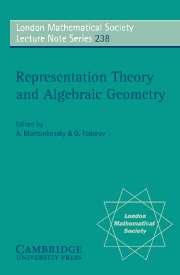Book contents
- Frontmatter
- Contents
- Preface
- Some Problems On Three-Dimensional Graded Domains
- The mathematical influence of Maurice Auslander in Mexico.
- Intertwined With Maurice
- Introduction to Koszul algebras
- Old and recent work with Maurice
- The Development of the Representation Theory of Finite Dimensional Algebras 1968 – 1975
- Algebraic Geometry Over Q
Some Problems On Three-Dimensional Graded Domains
Published online by Cambridge University Press: 06 December 2010
- Frontmatter
- Contents
- Preface
- Some Problems On Three-Dimensional Graded Domains
- The mathematical influence of Maurice Auslander in Mexico.
- Intertwined With Maurice
- Introduction to Koszul algebras
- Old and recent work with Maurice
- The Development of the Representation Theory of Finite Dimensional Algebras 1968 – 1975
- Algebraic Geometry Over Q
Summary
Introduction.
One of the important motivating problems for ring theory is to describe the rings which have some of the properties of commutative rings. In this talk we consider this problem for graded domains of dimension 3. The conjectures we present are based on ideas of my friends, especially of Toby Stafford, Michel Van den Bergh, and James Zhang. However, they may not be willing to risk making them, because only fragments of a theory exist at present. Everything here should be taken with a grain of salt. I am especially indebted to Toby Stafford for showing me some rings constructed from differential operators which I had overlooked in earlier versions of this manuscript.
To simplify our statements, we assume throughout that the ground field k is algebraically closed and of characteristic zero, and that our graded domain A is generated by finitely many elements of degree 1. The properties which we single out are:
(i) A is noetherian,
(ii) there is a dualizing complex w for A such that the Auslander conditions hold, and
(iii) the Gelfand-Kirillov dimension behaves as predicted by commutative algebra.
A dualizing complex w is a complex of bimodules such that the functor M__> MD = RHom(M,w) defines a duality between the derived categories of bounded complexes of finite left and right A-modules. We will require it to be balanced in the sense of Yekutieli, which means that kD is the appropiate shift of k (see [Aj,Yl,Y2] for the precise definitions).
- Type
- Chapter
- Information
- Representation Theory and Algebraic Geometry , pp. 1 - 20Publisher: Cambridge University PressPrint publication year: 1997
- 12
- Cited by

